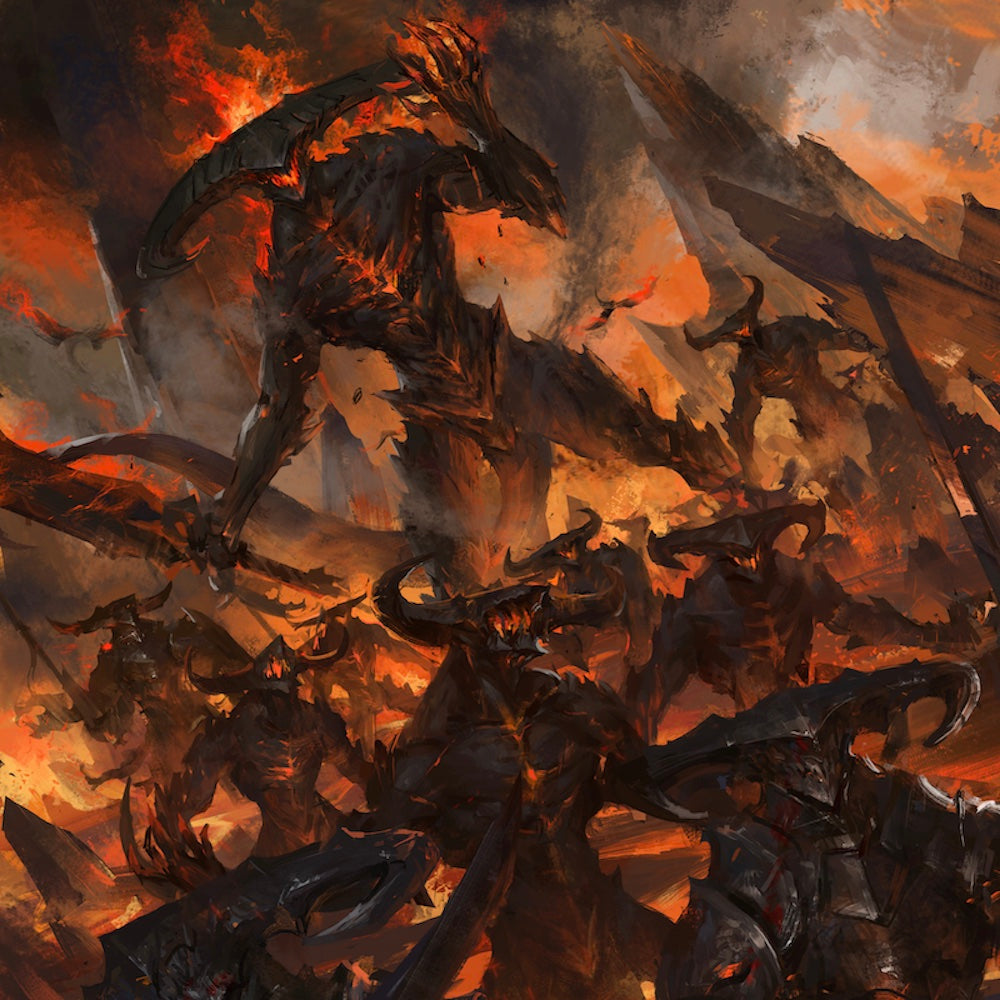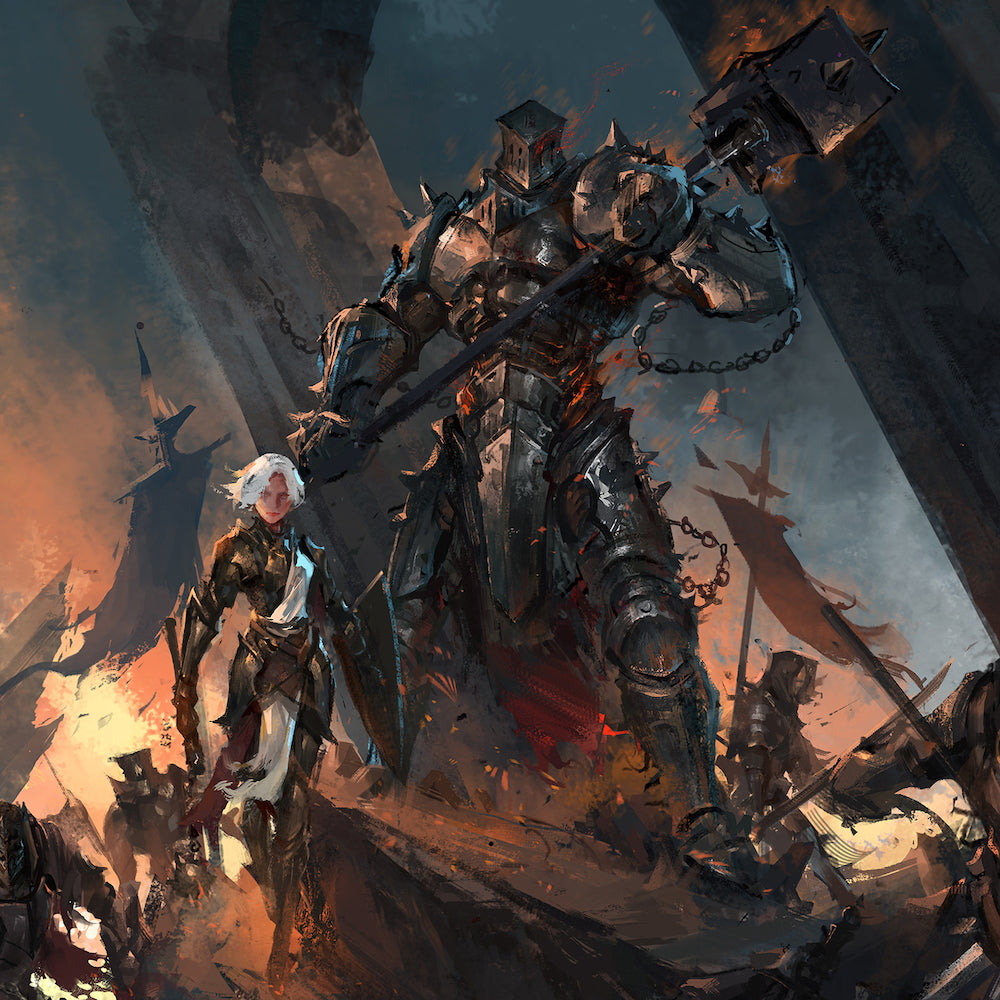Advanced Rules

Playing Multiple Dungeon Box Sets
The Black Keep Dungeon box sets are designed to be used individually but, they can also be used in an interconnected way. One the case of using multiple box sets, here are the key rules to follow:
- Up to 7 players can join in per dungeon box (controlling 6 playable minis and one person to control monsters in a single dungeon)
- Game tiles must still line up by movement grid across dungeons
- During deployment rolls, players / teams get to choose which dungeon they deploy to.
- Game cards from different dungeons are combined into decks (special items, traps, and objectives)
- Terrain and treasure markers can be placed anywhere but it might look better if they are placed in the appropriate dungeon.
- Terrain cannot block access from dungeon to dungeon but, monsters can.
Playing as the Master of Monsters
When you play as the Monster Master, you can move monsters D6 squares from their base edge. Terrain may block the monsters movement.
In combat, monsters fight last but you will be in charge of all attack rolls and saving throws.

Random Encounters
When using the Random Encounters rule, you can add D6 divided by 2 models to the dungeon around the boss monster at the end of a full round of player turns. These miniatures can be moved by a Monster Master out from that point to engage with all playable miniatures. They may use the rules as defined by a player profile card or be considered minion monsters for the sake of combat. If they leverage a player profile card, when they move into combat, they have initiative like a regular opponent.
Dropping Items and Passing Items
When using the "Item Drop" rule, the place in which you died is marked with a D6 and all of your special items (both positive and negative) are stacked in a pile marked with another D6 showing the same value. Another player may go towards your loot pile and pick it up. The player retrieving the loot must discard anything beyond their 5 positive items and 5 negative items. You are out and have very little chance of winning via Exp Points. But the remaining players can enjoy a stacked deck.
When the game gets down to 2 players, and one of the two die, they compare Exp Points by adding up all of their items and referring to their objective card (if the objective has been met) to see who won.
When using the "Pass Items" rule, you may move into B2B contact with another player (friendly or not) and pass or swap 1 item with them. They can discard items to stay within the number of available slots on the positive or negative side of their player profile card.
Fear and Flight
COMING SOON - Add rules for panicking when friendly models are slain in your line of sight.
Unnatural Powers
Magic Powers
COMING SOON - Add magic powers for ranged and special attacks.
Playing with Fire
COMING SOON - Alchemical concoctions, blast radius and residual effects.
Other Advanced Rules
Dungeon Hazards
When using the "Dungeon Hazards" rule, at the beginning of each movement phase, roll a D6. On a roll of 1, you face spears shooting out of the wall or a giant axe swinging out. Make a standard saving throw.
Secret Doors
When using the "Secret Doors" rule, at the beginning of each movement phase, roll a D6. On a roll of 6, you find a secret doorway to a path between dungeon areas. Move to the edge of the next closest game tile.
Movement without Rolling
When players want a more straight forward experience in terms of movement, they can opt to choose standard distance for each miniature. My recommendation is a base movement that accounts for the fact that some profile cards have a movement bonus. Also, it is recommended that you don't apply a base movement over 4 squares; as this could make for a slightly unfair advantage. But this rule can be as flexible as players like. It's only important that all players agree on base movement value(s) and it may be helpful to write the value down before play starts.
Campaign Play
The Campaign Game Mode allows you to play multiple, connected games with up to 6 friends. You can use any combination of standard and advanced rules during the campaign but you should make note of which rules will be used during the campaign. These games can occur in one dungeon or across multiple dungeon box sets. Playing multiple dungeons in a single game is also possible.
Capturing the Story
When playing in a campaign it can be helpful to come up with a back story about why the quest must continue for a number of battles. The story is in your hands! Write something up and share it with your players. Keep it interesting by introducing a twist before each game.
Playing Multiple Games and Tracking Results
When playing in Campaign mode, each player can keep one special item per game, and take it with them into the next game. Also, Exp Points are tracked at the end of each game and should be noted in writing.
Using Exp Points to buy Special Abilities
Below is a list of special abilities that can be purchased with accumulated Exp Points. Once the points are spent, they are gone, and any written notes should reflect this. You cannot trade special abilities in for Exp Value:
- Shadow Walker | 10 Exp Points - Allows a player to move through terrain
- Swift Blade | 10 Exp Points - +1 Attack against monsters
- Keen Eye | 10 Exp Points - Avoids all traps
- Battle Ready | 15 Exp Points - Starts game with 1 additional special item card
- Heavy Armor | 15 Exp Points - +1 Defense
- Necromancer | 25 Exp Points - Allows a player to bring back friendly players



Leave a comment